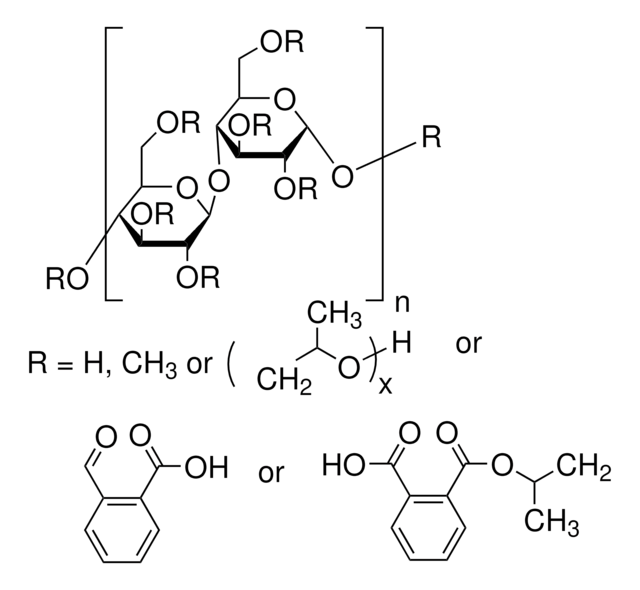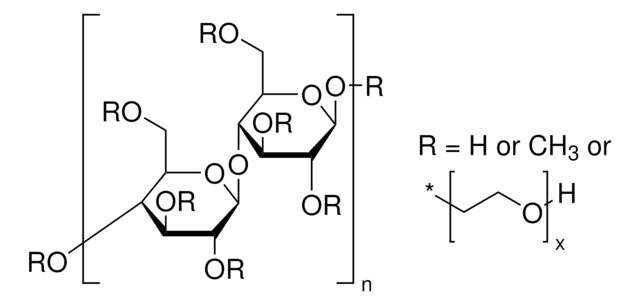H9262
(Hydroxypropyl)methyl cellulose
viscosity 80-120 cP, 2 % in H2O(20 °C)(lit.)
Synonym(s):
2-Hydroxypropyl methyl cellulose ether
Sign Into View Organizational & Contract Pricing
All Photos(4)
About This Item
Recommended Products
Looking for similar products? Visit Product Comparison Guide
Application
(Hydroxypropyl)methyl cellulose acts as a thickener for aqueous and non-aqueous systems, is a water retention aid and steric stabilizer, and clear films with grease resistance. (Hydroxypropyl)methyl cellulose has been used to study mucoadhesion in the design of drug delivery systems to prolong intestinal residence time and has also been used to study the enhancement of dissolution rate of poorly water soluble drugs.
Thickener for aqueous and non-aqueous systems, clear films with grease resistance, binders, lubricants, steric stabilizer and water retention aid.
Features and Benefits
Dissolves in water, undergoes reversible gelation upon heating, non-ionic, does not complex with ionic species and is surface active and enzyme resistant. Solutions are pseudoplastic.
Other Notes
To gain a comprehensive understanding of our extensive range of Polysaccharides for your research, we encourage you to visit our Carbohydrates Category page.
Storage Class Code
11 - Combustible Solids
WGK
WGK 1
Flash Point(F)
Not applicable
Flash Point(C)
Not applicable
Personal Protective Equipment
dust mask type N95 (US), Eyeshields, Gloves
Certificates of Analysis (COA)
Search for Certificates of Analysis (COA) by entering the products Lot/Batch Number. Lot and Batch Numbers can be found on a product’s label following the words ‘Lot’ or ‘Batch’.
Already Own This Product?
Find documentation for the products that you have recently purchased in the Document Library.
Customers Also Viewed
Deirdre M D'Arcy et al.
AAPS PharmSciTech, 20(2), 47-47 (2019-01-09)
Viscosity, influenced by medium composition, will affect the hydrodynamics of a dissolution system. Dissolution simulation methods are valuable tools to explore mechanistic dissolution effects, with an understanding of limitations of any simulation method essential to its appropriate use. The aims
Lucas Sievens-Figueroa et al.
International journal of pharmaceutics, 423(2), 496-508 (2011-12-20)
The design and feasibility of a simple process of incorporating stable nanoparticles into edible polymer films is demonstrated with the goal of enhancing the dissolution rate of poorly water soluble drugs. Nanosuspensions produced from wet stirred media milling (WSMM) were
Fernando Andrés et al.
Proceedings of the National Academy of Sciences of the United States of America, 111(26), E2760-E2769 (2014-07-01)
In Arabidopsis thaliana environmental and endogenous cues promote flowering by activating expression of a small number of integrator genes. The MADS box transcription factor SHORT VEGETATIVE PHASE (SVP) is a critical inhibitor of flowering that directly represses transcription of these
Jeonghoon Han et al.
Aquatic toxicology (Amsterdam, Netherlands), 152, 308-317 (2014-05-13)
In this study, we investigated the effects of the water-accommodated fraction (WAF) of crude oil on the development and reproduction of the intertidal copepod Tigriopus japonicus through life-cycle experiments. Furthermore, we investigated the mechanisms underlying the toxic effects of WAF
Somayeh Bahrami et al.
Veterinary parasitology, 203(1-2), 43-50 (2014-03-19)
Fasciola gigantica is a parasitic helminth that predominantly infects the liver and bile ducts of cattle and causes great losses of cattle production in the southwestern regions of Iran. The purpose of the present study was to find out the
Our team of scientists has experience in all areas of research including Life Science, Material Science, Chemical Synthesis, Chromatography, Analytical and many others.
Contact Technical Service




